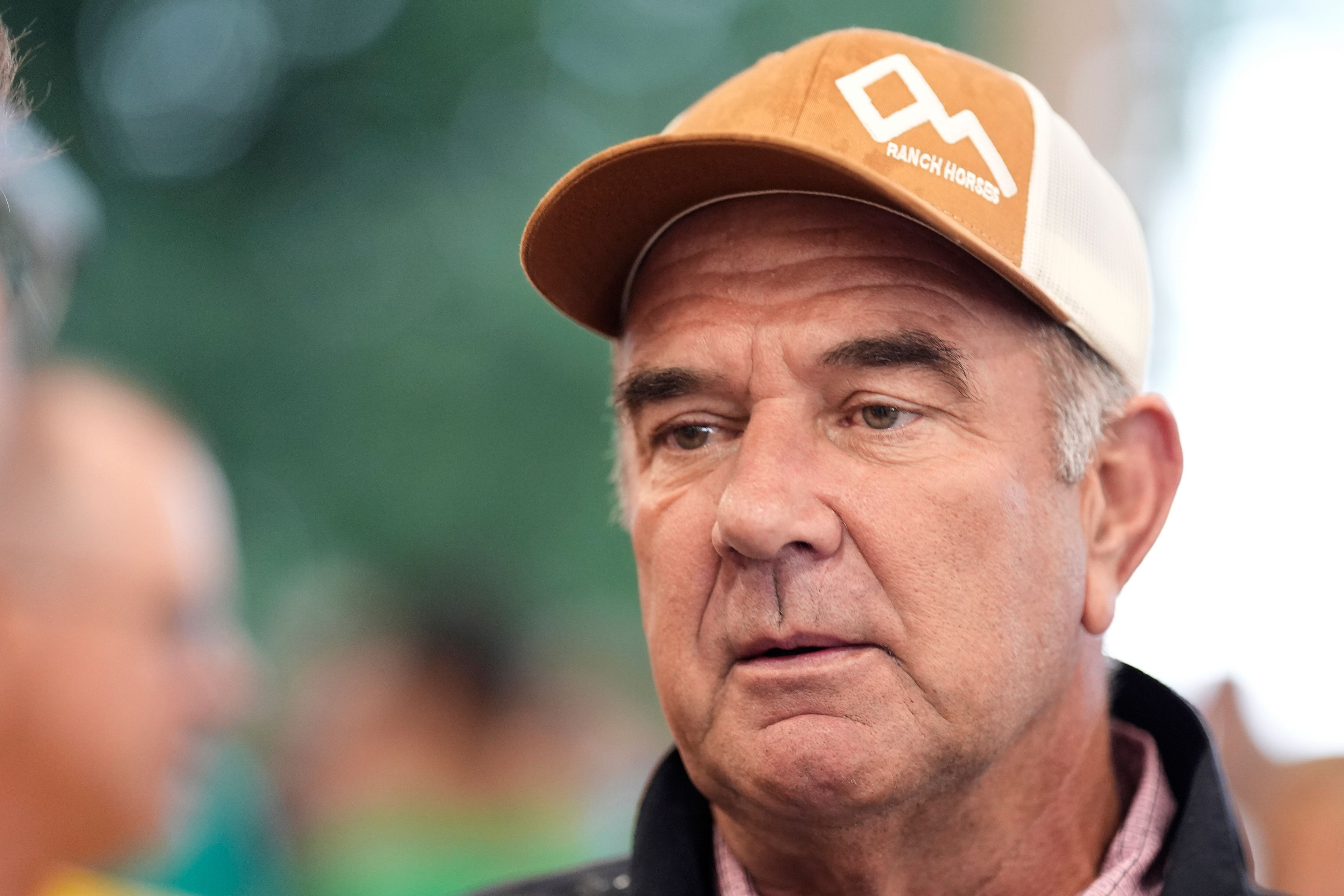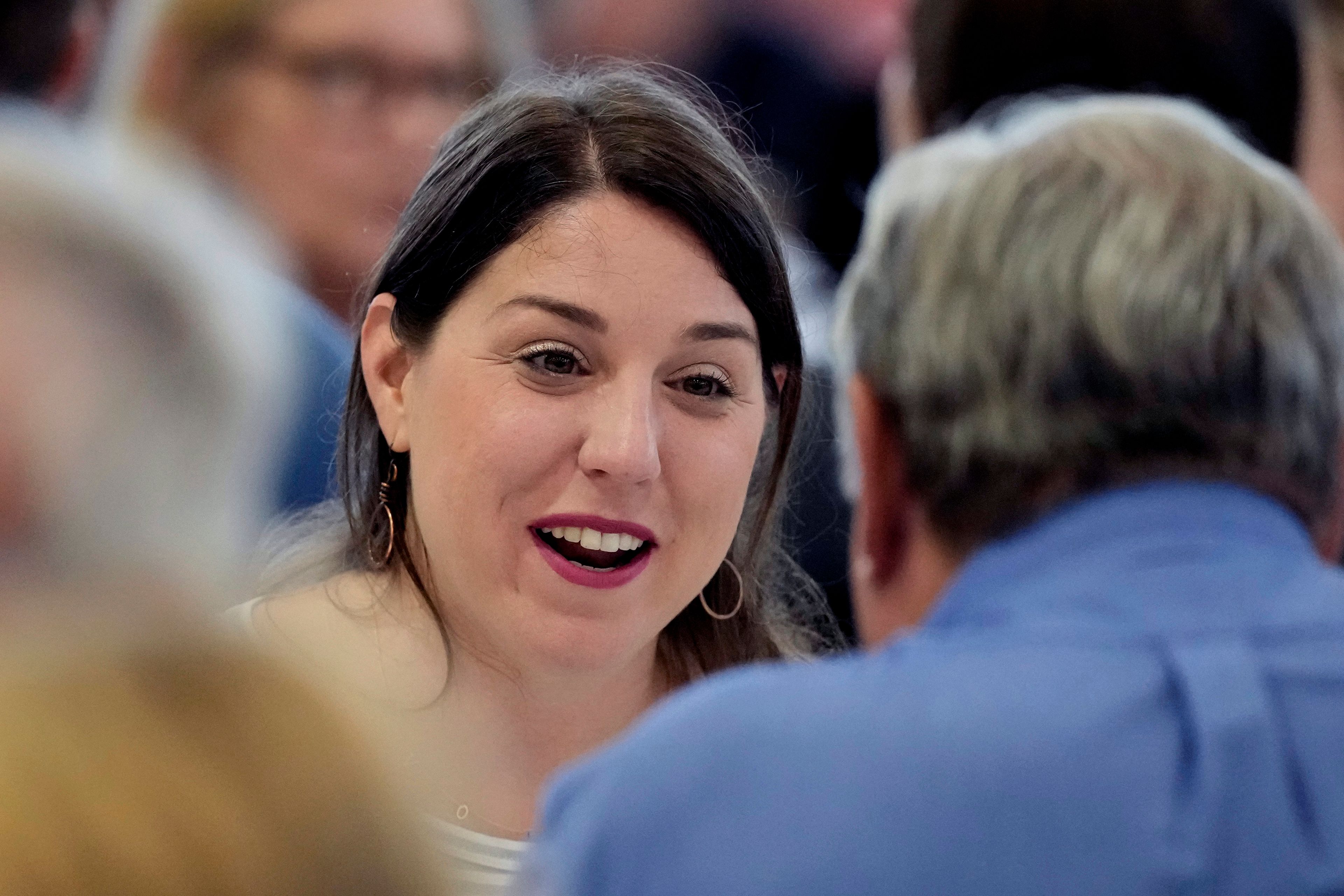Top state offices on Missouri ballot in November
Missouri gears up for pivotal elections as Governor Parson's term ends. Key races include governor, lieutenant governor, secretary of state, treasurer and attorney general, with new leadership on the horizon.
With Mike Parson’s tenure coming to a close, Missourians will elect a new governor during the Tuesday, Nov. 5, general election in two weeks.
Four candidates, Democrat Crystal Quade, Republican Mike Kehoe, Libertarian Bill Slantz and Green Party candidate Paul Lehmann will go head-to-head on Election Day for Missouri’s highest seat. Additionally, two other state executive offices are guaranteed to have new faces while two incumbents attempt to keep their seats.
Here is what voters should know about each race leading up to the election.
Governor
The four-way race for governor will likely be decided by the two major party candidates, who are trying to take over the seat from Parson, a Republican, who has reached his term limit.
Mike Kehoe, the current lieutenant governor appointed by Parson in 2018, holds a double-digit lead over Quade in the polls. Kehoe defeated eight other Republicans during August’s primary election, beating Sen. Bill Eigel by 6.9% to earn the party’s nomination.
Kehoe is opposed to abortion rights and said the law laid out in Amendment 3 “goes way too far” and is “very extreme” in a recent candidate forum hosted by the Missouri Press Association. In addition, Kehoe opposes Proposition A and doesn’t believe the government should set wages and supports Amendment 2 to legalize sports betting. According to his website, Kehoe’s priorities include providing every child with a “world-class education”, expanding workforce development and “cutting red tape and burdensome regulations” to help attract more jobs to the state.
“I think all Missourians should be able to live the American dream, no matter what their background is or what neighborhood they grew up in,” Kehoe said during the forum. “That's why I've been very, very involved in supporting and expanding Missouri's vocational and technical training to make sure Missourians are trained for the high-paying jobs that I know our employers have to offer.”
Crystal Quade, a current state representative who has served as the Democratic Leader of the House of Representatives, soundly defeated her opponents during the August primary, winning by 18.5%.
She is almost the polar opposite of Kehoe on each issue, aside from Amendment 2, which she also supports. Quade has been outspoken in her support of abortion rights and supports a minimum wage increase. Additionally, according to Quade’s campaign website, she supports “standing up to corporate special interests, and stopping China and Russia from buying up our farmland and squeezing Missouri farmers out.”
“I'm running for governor, frankly, because we deserve better than what we've been getting,” Quade said. “Missouri ranks last in public education funding. We have crumbling roads and bridges, police shortages all across the state and the state of Missouri can't even pay its child care bills on time, and the folks who've been in charge are doing anything but paying attention to those issues.”
Bill Slantz has run for state office multiple times, including campaigns for the House of Representatives in 2018, lieutenant governor in 2020 and U.S. House in 2022. Slantz ran unopposed during the August primary.
Slantz's “key principles” include individual freedom, limited government, economic freedom and individualism. He believes the government’s main function is to “protect our personal security and defend against aggression.” According to his campaign website, Slantz is opposed to government regulations on businesses, drug use, education, religion, speech, wages and gun rights. He is in favor of open borders for immigrants who enter the country peacefully, phasing out Social Security and eliminating income taxes.
“I'm asking you to stop letting the government drive. Sit up in your seat, pay attention to what's going on and let's limit the government to its most basic functions,” Slantz said.
Paul Lehmann, a 1971 graduate of Southeast Missouri State University and an ordained minister in churches of the United Church of Christ, received the Green Party’s nomination for governor.
According to his profile on the Green Party’s website, Lehmann has also been a lifelong organic gardener and farmer. Protecting the environment in the face of global warming is one of his top priorities. In addition to the environment, Lehmann supports pro-choice legislation, public transportation initiatives, children's identity rights, workers’ rights, prison reform and education reform.
“I have education experience, I have ministerial experience and I want to run for governor to be able to be the first Green governor of the State of Missouri,” Lehmann said.
Lieutenant governor
With Kehoe stepping down as lieutenant governor to run for governor, four candidates — Republican David Wasinger, Democrat Richard Brown, Libertarian Ken Iverson and Green Party candidate Danielle Elliott — are vying for the seat.
David Wasinger defeated five other candidates in the August primary, escaping with a victory over Lincoln Hough by 7,508 votes. His platform is derived from his experience growing up in Hannibal, where he was raised by “hard-working parents” who instilled small-town conservative values in him and his siblings.
According to his website, Wasinger is committed to disrupting the political establishment, fighting back against the federal government, bringing accountability to state government, and delivering a conservative agenda that gets the government out of the way to bring opportunities for the next generation of Missourians to achieve the American Dream.
Richard Brown, a current Missouri state representative with a background in teaching, was dominant in his primary race, winning by more than 110,000 votes in August. His main points of emphasis in his campaign are lowering the cost of housing, making child care more affordable and increasing access to health care.
“I am not a politician, I am a public servant who has demonstrated leadership and common sense while serving with integrity in the state legislature,” Brown’s website states.
Ken Iverson, who ran unopposed in August, is an engineer and military veteran who served in two separate stints, one during the Vietnam era and after the Sept. 11, 2001, terrorist attacks.
He advocates for ending state income and personal property taxes, gun rights and keeping the Missouri National Guard in the country. Iverson is opposed to abortion and believes in ending corporate welfare and redistribution and increasing employment and business opportunities in the state.
Danielle Elliott, a certified medical coder, hopes to expose corruption in Jefferson City and improve communication between the state and its residents.
Elliott’s campaign revolves around informing citizens about programs that offer assistance but often aren’t utilized because they’re not known about. She also advocates for removing foreign-owned corporations from Missouri farmlands, mental health needs and increasing tourism in the state.
Secretary of state
Current Secretary of State Jay Ashcroft will leave his post at the end of the year after running for governor. His campaign fell short, with Ashcroft coming in third out of nine candidates.
Four candidates — Republican Denny Hoskins, Democrat Barbara Phifer, Libertarian Carl Freese and Green Party candidate Jerome Bauer — each received their party’s nominations to attempt to replace Ashcroft.
Denny Hoskins, a current state senator and former representative, defeated seven other Republicans in the August primary, winning by more than 43,000 votes.
His platform includes keeping abortion illegal in the state, pushing for election reforms such as Missouri’s voter identification law, keeping critical race theory and diversity, equity and inclusion out of public schools and supporting gun rights.
Barbara Phifer is a state representative who has served since 2021. During the primary, she defeated challengers Monique Williams and Haley Jacobson in a relatively close race.
Phifer aims to keep Missouri’s elections “free, fair, transparent and accessible to every eligible voter.” Additionally, she is a major supporter of public libraries and the expansion of state residents’ rights, including access to reproductive care and supporting public education.
Carl Freese won the Libertarian nomination in an unopposed race in August and is running for secretary of state for the second time. He had previously run for state representative in 2018. According to Freese’s campaign social media, he is a member of the National Rifle Association and a member of the United Church of Christ.
Jerome Bauer has run for state office several times, notably for the U.S. Senate in 2018 and governor in 2020. He has also run for several offices within the City of St. Louis. He supports a single-payer health care system, disability rights and transportation equity.
Treasurer
Republican treasurer Vivek Malek is seeking reelection. Malek was appointed by Parson to the office in December 2022, succeeding Scott Fitzpatrick in the role.
Vivek Malek won his right to run for reelection with a landslide victory in the August primary. The Southeast Missouri State University alum received 273,691 votes to defeat second-place challenger state Sen. Andrew Koenig by 138,000 votes.
Malek, a native of India who came to Cape Girardeau in 2001 to attend SEMO, is a member of the NRA and is pro-life. According to his website, Malek will “protect taxpayer money from liberal waste, fraud and abuse.” His priorities include promoting taxpayer investments, promoting opportunities for Missouri residents, emphasizing the “American Dream” and standing up to the “woke agenda”.
His Democratic challenger, Mark Osmack, won his nomination in an unopposed race and had previously run for Congress in 2018. He is an Army veteran who served in two deployments to Afghanistan. After leaving the Army, Osmack received a master’s degree in public administration from George Washington University and spent time working in government affairs.
As treasurer, Osmack’s goals are to keep families in Missouri by lowering costs, protect funding for retirees and farmers and increase resources for first responders and teachers. According to his website, Osmack believes Missourians “deserve a Treasurer who’s focused on the bottom line — not politics.”
Libertarian candidate John Hartwig, a military veteran who served two years in the Army Finance Corps as a finance disbursing officer during the Vietnam War, also ran unopposed during the primary election.
A certified accountant, Hartwig has been in practice for more than 50 years and has served “a variety of retail, wholesale, manufacturing, health professionals, and not-for-profit clients”, according to his campaign website.
Reagan Haase is the Green Party candidate for treasurer. This is her first attempt at running for state office. No other information on Haase is publicly available.
Attorney general
Andrew Bailey, the Republican incumbent attorney general, seeks reelection in a three-way race against Democrat Elad Gross and Libertarian Ryan Munro.
Andrew Bailey, who handily defeated his primary opponent, Will Scharf, has served as the state’s attorney general since 2023. He was appointed by Parson after former AG Eric Schmitt was elected to the U.S. Senate.
Bailey, a decorated veteran of the U.S. Army who was commissioned as an officer following his college graduation, became a prosecuting attorney after graduating with a law degree from the University of Missouri. Since then, Bailey has served as assistant attorney general and assistant prosecuting attorney with the Warren County Prosecuting Attorney’s Office, general counsel for the Missouri Department of Corrections and as deputy and general counsel in the governor’s office.
Bailey’s Democratic challenger, Elad Gross, is running for the office for a second time after falling short in the 2020 primary election.
Gross, who ran unopposed in this year's primary, is a constitutional and civil rights attorney who, according to his website, has “successfully defended Missouri's Sunshine Law at our state Supreme Court, stopped our state government from persecuting whistleblowers, protected workers' rights on the job and secured the release of innocent Missourians from illegal jailings.”
Gross’ plans as AG include suing scammers, launching a Civil Rights Division to help protect families, prosecuting corruption and ending Missouri’s status as “the puppy mill capital of the country.”
Ryan Munro, an attorney and business owner running on the Libertarian ticket, is seeking state office for the first time. He describes his campaign as a “true grassroots effort” because he doesn’t accept donations.
If elected, Munro hopes to “tackle government overreach and empower our citizens”, according to his website, by protecting property rights, privacy and freedom from government intrusion. Additionally, he plans to ensure Missourians are heard on issues such as surveillance, gun rights and individual privacy.
Connect with the Southeast Missourian Newsroom:
For corrections to this story or other insights for the editor, click here. To submit a letter to the editor, click here. To learn about the Southeast Missourian’s AI Policy, click here.









